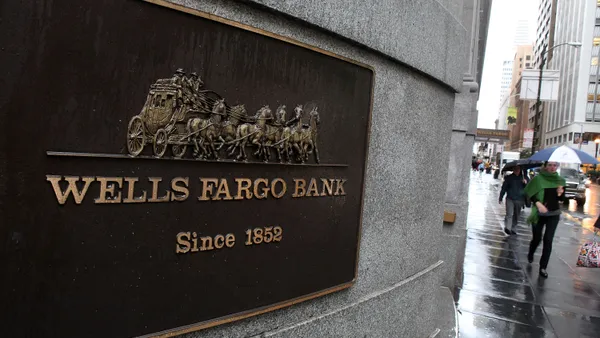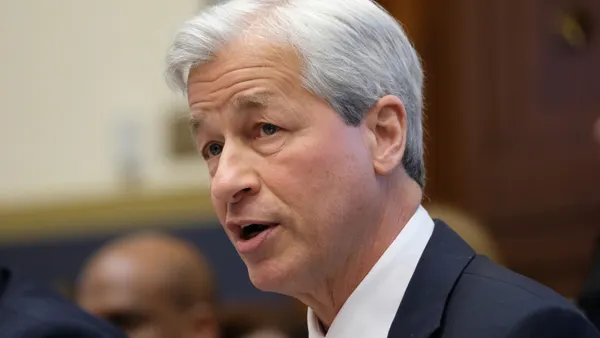Dive Brief:
- Atlanta Fed President Raphael Bostic will retire when his term ends Feb. 28, he announced Wednesday.
- Bostic’s departure comes as the seven members of the Federal Reserve’s board of governors must agree to the reappointment of the Fed system’s 12 regional presidents to new five-year terms that start March 1.
- Bostic has come under fire since 2022 over improperly disclosed financial transactions. Bostic’s trading activity violated two Federal Open Market Committee rules and two Atlanta Fed code-of-conduct policies, the Fed’s Office of Inspector General found last year.
Dive Insight:
A search committee of non-banking members of the Atlanta Fed's board of directors will conduct a nationwide search for Bostic’s successor. If one is not appointed by Feb. 28, Cheryl Venable, the Atlanta Fed’s first vice president and chief operating officer, will take on the president’s duties in the interim.
The Fed’s board can veto whom the Atlanta Fed picks, but that amounts ultimately to influence over the process rather than control.
Bostic’s departure comes after a summer of upheaval at the Federal Reserve – in which Trump administration officials arguably used an over-budget renovation at two Fed buildings to try to force Chair Jerome Powell to resign. President Donald Trump also attempted to fire Fed Gov. Lisa Cook, although the Supreme Court blocked the move.
Meanwhile, now-former Fed Gov. Adriana Kugler resigned ahead of the end of her term, and the Senate approved low-interest-rate stalwart Stephen Miran to a governor post through January.
In a statement Wednesday, Bostic nodded to the “privilege” of serving at the Fed.
“I feel incredibly fortunate to have worked with the Atlanta Fed's outstanding staff to fulfill the Federal Reserve's mission and serve the Sixth District and the American people," Bostic said Wednesday, ahead of scheduled remarks at the Atlanta Economics Club. "I'm proud of what we accomplished during my tenure to turn the lofty goal of an economy that works for everyone into more of a reality, and I look forward to discovering new ways to advance that bold vision in my next chapter."
Powell, too, referenced “privilege” when describing working alongside Bostic.
"His perspective has enriched the Federal Open Market Committee's understanding of our dynamic economy. And his steady voice has exemplified the best of public service — grounded in analysis, informed by experience, and guided by purpose,” Powell said. “His leadership has strengthened our institution and advanced the Federal Reserve's mission.”
Bostic is not one of the regional Fed presidents voting on interest rate decisions this year, so his departure won’t affect the ever-present Trump push for reduced rates.
The outgoing Atlanta chief has said he supported the Fed’s rate decreases in September and October but stressed that monetary policy should remain restrictive while inflation is still above the central bank’s 2% goal.
At the time of his appointment in 2017, Bostic became the first Black and first openly gay regional Fed president.
His tenure, though, was not without controversy. He volunteered in 2022 that he improperly disclosed financial transactions for several years because he misunderstood trading restrictions and wanted to avoid perceived conflict of interest by holding his assets in managed accounts he could not direct. Amended disclosures revealed more than 150 transactions that had been settled on blackout dates before and after Fed policy meetings.
The disclosure came roughly a year after two regional Fed presidents, Eric Rosengren in Boston and Robert Kaplan in Dallas, resigned after similar financial forms showed they traded stocks at the start of the COVID-19 crisis while also helping to set monetary policy.
Bostic disclosed a second, smaller set of prohibited transactions in 2023.
Gregory Haile, the chair of the Atlanta Fed board of directors, thanked Bostic on Wednesday “for his excellent leadership, intellectual integrity and dedication to serving the American people.”
"President Bostic leaves the Atlanta Fed united in a shared purpose and a vision for progress that extends across the Federal Reserve System," Haile said in a statement Wednesday. "The board will work diligently to find the next leader of the Atlanta Fed, someone who will continue to advance the critical work of the central bank and is committed to strengthening the economy and our communities by fostering the stability, integrity, and efficiency of our nation's monetary, financial, and payments systems."
The Atlanta Fed president next participates in the FOMC’s interest rate-setting decisions in 2027.
Bostic, 59, could have served as the Atlanta Fed’s president for another six years before hitting a mandatory retirement age.













